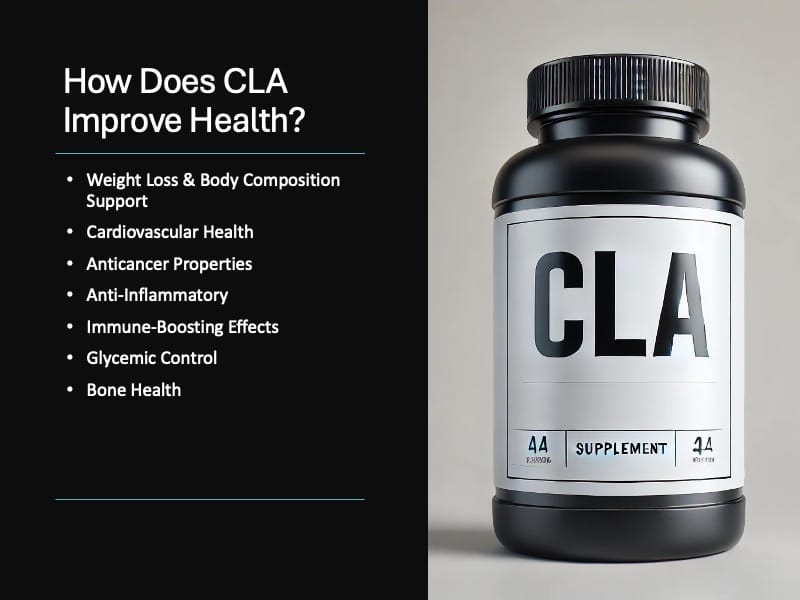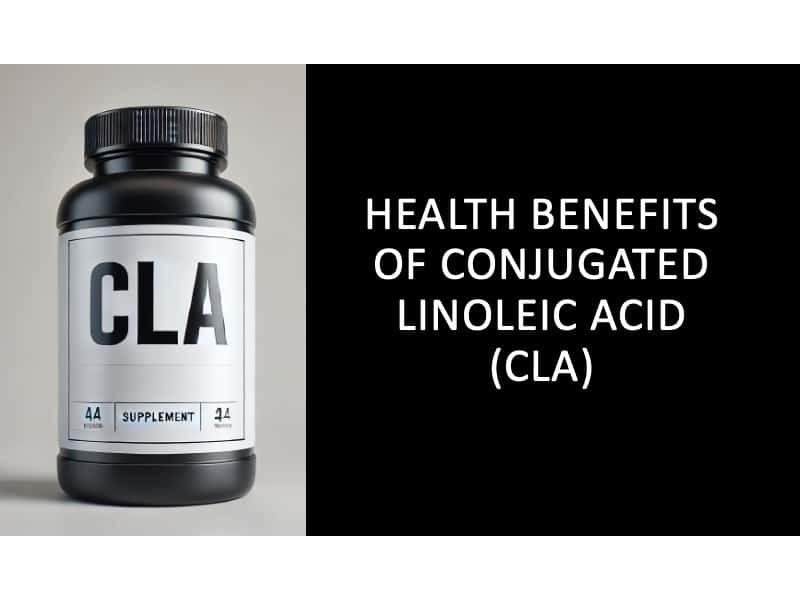Health Benefits of Conjugated Linoleic Acid (CLA)
Conjugated Linoleic Acid (CLA) is a naturally occurring fatty acid primarily found in the meat and dairy products of ruminant animals.
As a polyunsaturated fat with unique isomers, CLA has gained significant attention for its potential health benefits, including its role in body composition, metabolic health, and anti-inflammatory properties.
Over the years, I’ve consistently used CLA supplements because I’ve noticed their general health benefits and have also used them in hopes of improving my body composition.
In the past, I had good success combining CLA with sesamin for weight loss—particularly with a supplement called Nutrabolics Super Fats, which, although discontinued, can still be found through third-party resellers.
I found that combination effective for helping me maintain more muscle while shedding fat.
These days, I use CLA supplements on and off, but I regularly get additional CLA through RSP Amino Lean, which is one of my all-time favorite supplements for building muscle and improving body composition due to its CLA content.
This article explores the various health benefits of CLA, its food sources, the impact of supplementation, and the synergistic role of CLA and sesamin in supporting weight loss.
Health Benefits of Conjugated Linoleic Acid

CLA is a promising natural compound with various health benefits, particularly in body composition, cardiovascular health, and cancer prevention.
While its effects on fat loss and metabolic health are well-documented in animal studies, more research is needed to confirm its efficacy in humans.
The combination of CLA and sesamin shows potential as an effective strategy for weight loss and fat reduction. However, given the mixed results in clinical studies, it is essential to approach CLA supplementation with a personalized and cautious perspective.
Weight Loss & Body Composition Support
CLA has been extensively studied for its effects on body composition, specifically for people who want to cut fat without losing muscle.
Research indicates that CLA supplementation can promote lipolysis (fat breakdown) and reduce adipocyte (fat cell) size by inhibiting lipoprotein lipase activity while increasing carnitine-palmitoyl-transferase-1 (CPT-1) activity, which plays a role in fatty acid oxidation.
However, while animal studies consistently show positive results, human studies have produced mixed outcomes. Some report modest fat loss, while others note limited or no effect on weight reduction.
Combining CLA with sesamin, a lignan found in sesame seeds, may amplify weight loss effects by enhancing the body’s fat-burning capabilities. Sesamin has been shown to increase the activity of fatty acid oxidation enzymes and upregulate genes involved in lipid metabolism, which can complement CLA’s effects on fat breakdown.
The synergistic action of these two compounds can lead to improved body composition by maximizing fat loss while preserving lean muscle mass.
Cardiovascular Health
CLA has demonstrated potential benefits in cardiovascular health by modulating lipid metabolism and reducing markers of inflammation. It has been shown to improve blood lipid profiles, decrease triglyceride levels, and reduce atherosclerosis risk by activating nuclear receptors such as PPARγ (peroxisome proliferator-activated receptor gamma).
Notably, the cis-9, trans-11 isomer of CLA has been linked to reduced blood pressure and improved endothelial function, which are crucial for cardiovascular health.
Anticancer Properties
One of the most promising areas of CLA research is its potential anticancer effects.
CLA’s isomers, particularly cis-9, trans-11 (c9, t11) and trans-10, cis-12 (t10, c12), have shown the ability to inhibit the growth of various cancer cells, including those of the breast, colon, and liver.
These effects are thought to be mediated by CLA’s ability to modulate cellular signaling pathways involved in apoptosis (cell death) and angiogenesis (formation of new blood vessels).
Although the evidence from human trials remains limited, CLA’s role in supporting cancer treatment is an area of growing interest.
Anti-inflammatory and Immune-Boosting Effects
CLA supplementation has been shown to reduce inflammatory markers, such as TNF-alpha and C-reactive protein (CRP), in various inflammatory conditions, including rheumatoid arthritis.
It also enhances immune responses by modulating cytokine production and increasing antibody formation, suggesting its potential to alleviate symptoms of autoimmune and inflammatory diseases.
Glycemic Control
Emerging research suggests that CLA may help improve glycemic control by enhancing insulin sensitivity and reducing blood glucose levels.
Bone Health
Lastly, CLA has been associated with increased bone mineralization, which may support bone health and reduce the risk of osteoporosis.
Food Sources of Conjugated Linoleic Acid
CLA is naturally present in the fats of ruminant animals, with the highest concentrations found in grass-fed beef, lamb, and dairy products such as milk, cheese, and butter.
Meat from pasture-grazed animals tends to have higher CLA content compared to grain-fed livestock. While CLA is also present in trace amounts in some plant oils, its levels are significantly lower compared to animal-based sources.
- Grass-fed Beef: Contains about 2.9 to 4.3 mg of CLA per gram of fat.
- Dairy Products: Cheese and butter are rich sources, with CLA content varying based on the animal’s diet.
- Lamb: Lamb meat contains comparable levels of CLA to beef.
- Full-fat Milk: A good source of CLA, especially when sourced from grass-fed cows.
CLA Supplements: Benefits and Considerations
CLA supplements, typically derived from safflower oil or sunflower oil, are widely used for their potential to enhance fat metabolism and body composition.
Sunflower and safflower oils are not naturally high in Conjugated Linoleic Acid (CLA) like animal-based sources such as beef and dairy.
However, they are often used in the production of CLA supplements because they can be chemically altered to produce specific CLA isomers (such as cis-9, trans-11, trans-10, and cis-12) that have beneficial effects on metabolism and body composition.
- Animal-based sources like beef and dairy are naturally rich in CLA, but not used for CLA supplements.
- Sunflower and safflower oils are used in CLA supplements due to their ability to be processed into effective CLA isomers.
- They are not naturally high in CLA but are transformed into the bioactive forms found in supplements.
Clinical studies suggest that taking 3.2 to 3.4 grams of CLA per day for at least six months can result in significant reductions in body fat and improvements in lean body mass.
However, it is important to note that CLA supplementation may have adverse effects on glucose metabolism and lipid profiles in some individuals .
How Do CLA Supplements Work?
CLA supplements work by influencing metabolic pathways that regulate fat storage and energy expenditure. The trans-10, cis-12 isomer of CLA has been identified as the most potent in reducing fat mass by stimulating the browning of white adipose tissue and enhancing mitochondrial activity.
This process increases thermogenesis (heat production), contributing to greater energy expenditure and, eventually, weight loss.
Potential Risks and Side Effects
While CLA has numerous health benefits, it is essential to be cautious about its potential side effects.
High doses of CLA have been associated with insulin resistance, increased liver fat, and changes in lipid profiles, which may elevate the risk of metabolic complications.
Individuals considering CLA supplements should consult with a healthcare provider to assess their specific needs and risk factors.
Best CLA Supplement
The BulkSupplements.com Conjugated Linoleic Acid (CLA) Softgels are the most cost-effective and high-quality option for CLA supplementation.
Sourced from safflower oil, they provide a potent dose of 2000 mg per serving, promoting fat metabolism and energy production.
Priced at only $0.06 per softgel, they are one of the most affordable options on the market. With a 4.5-star rating from over 8,799 reviews, these softgels are trusted for their quality and effectiveness.
- Cost-effective: Only $17.96 for 300 softgels (about $0.06 per softgel).
- High-quality ingredients: Sourced from safflower oil, dairy-free, soy-free, and sugar-free.
- Convenient dosage: 2000 mg per serving, easy to take.
- Proven reliability: Manufactured under cGMP standards and third-party tested for quality.
Last update on 2025-07-03 / This article includes affiliate links/Images via Amazon Product Advertising API. I may earn commissions on purchases made through these links.
This website does not provide medical advice. This website site does contain affiliate links, and purchases may earn a commission.
Read my Medical Disclaimer, Review Disclaimer, and Publishing Policies for more details. Use of this site indicates acceptance of these terms.




